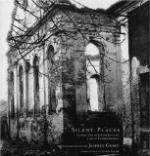The beautiful buckskin garments were hastily exchanged for ordinary apparel. By dint of much wading, tugging, and rolling the carcass was teased to the dry beach. There the body was securely anchored by the paws to small trees, and the work of skinning and butchering began.
Not a shred was wasted. Whatever flesh would not be consumed within a few days they cut into very thin strips and hung across poles to dry. Scraps went to the dogs, who were for once well fed. Three of the older squaws went to work with bone scrapers to tan the hide. In this season, while the fur was not as long as it would be later, it was fine and new. The other squaws pitched camp. No right-minded Indian would dream of travelling further with such a feast in prospect.
While these things were preparing, the older men cleaned and washed the bear’s skull very carefully. Then they cut a tall pole, on the end of which they fastened the skull, and finished by planting the whole affair securely near the running water. When the skull should have remained there for the space of twelve moons, the sacred spirit of the departed beast would be appeased. For that reason Haukemah would not here leave his customary hieroglyphic record when he should break camp. If an enemy should happen along, he could do harm to Haukemah simply by overturning the trophy, whereas an unidentified skull might belong to a friend, and so would be let alone on the chance. For that reason, too, when they broke camp the following day, the expert trailers took pains to obliterate the more characteristic indications of their stay.
Now abruptly the weather changed. The sky became overcast with low, gray clouds hurrying from the northwest. It grew cold. After a few hours of indecision it began to rain, dashing the chill water in savage gusts. Amidships in each canoe the household goods were protected carefully by means of the wigwam covers, but the people themselves sat patiently, exposed to the force of the storm. Water streamed from their hair, over their high cheeks, to drip upon their already sodden clothing. The buckskin of their moccasins sucked water like so many sponges. They stepped indifferently in and out of the river,—for as to their legs, necessarily much exposed, they could get no wetter—and it was very cold. Whenever they landed the grass and bushes completed the soaking. By night each and every member of the band, including the two white men, were as wet as though they had plunged over-head in the stream. Only there was this difference: river-water could have been warmed gradually by the contact of woolen clothes with the body, but the chill of rain-water was constantly renewed.
Nor was there much comfort in the prospect when, weary and cold, they finally drew their canoes ashore for the evening’s camp. The forest was dripping, the ground soggy, each separate twig and branch cold and slippery to the hand. The accumulated water of a day showered down at the slightest movement. A damp wind seemed to rise from the earth itself.




